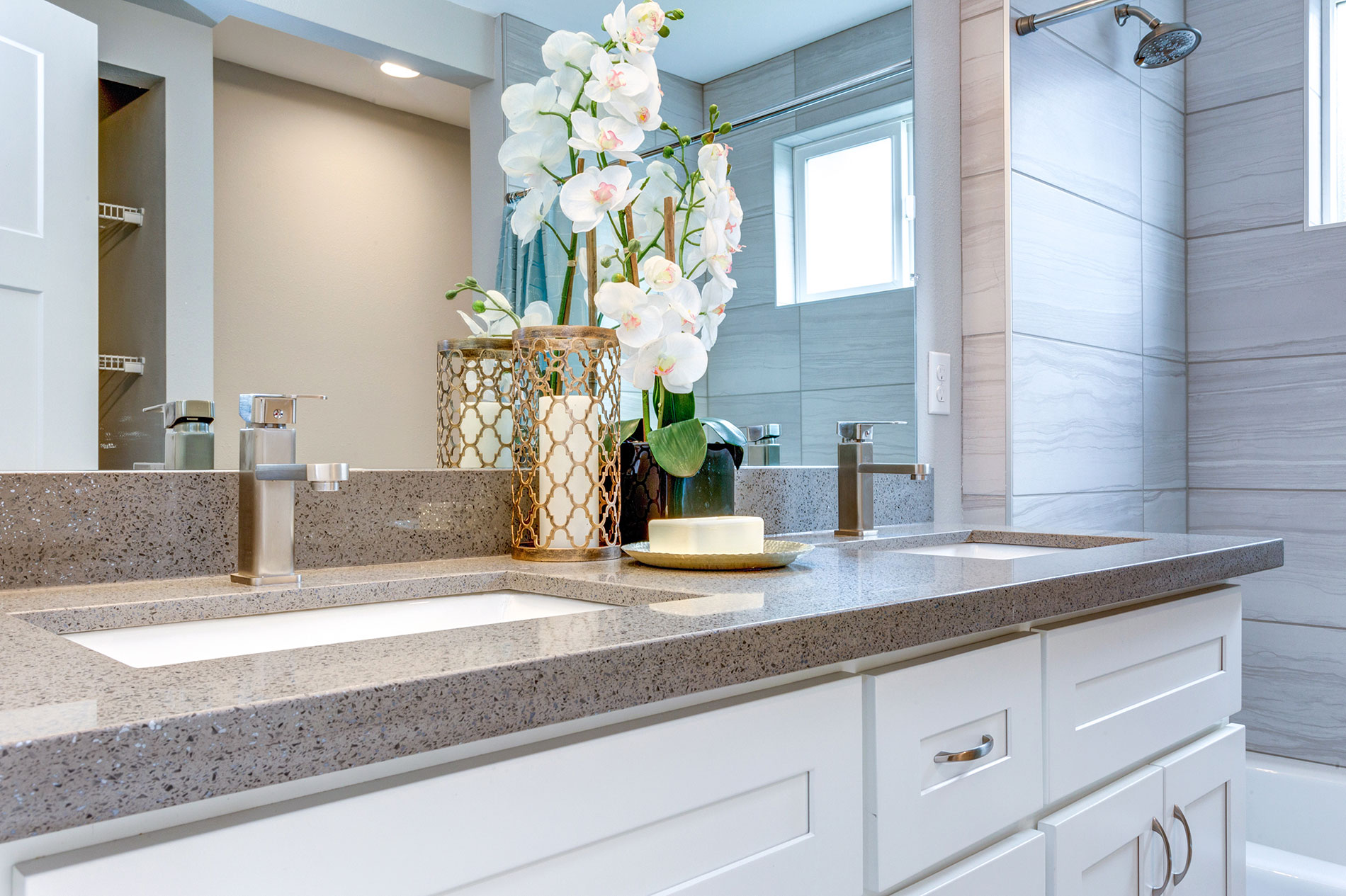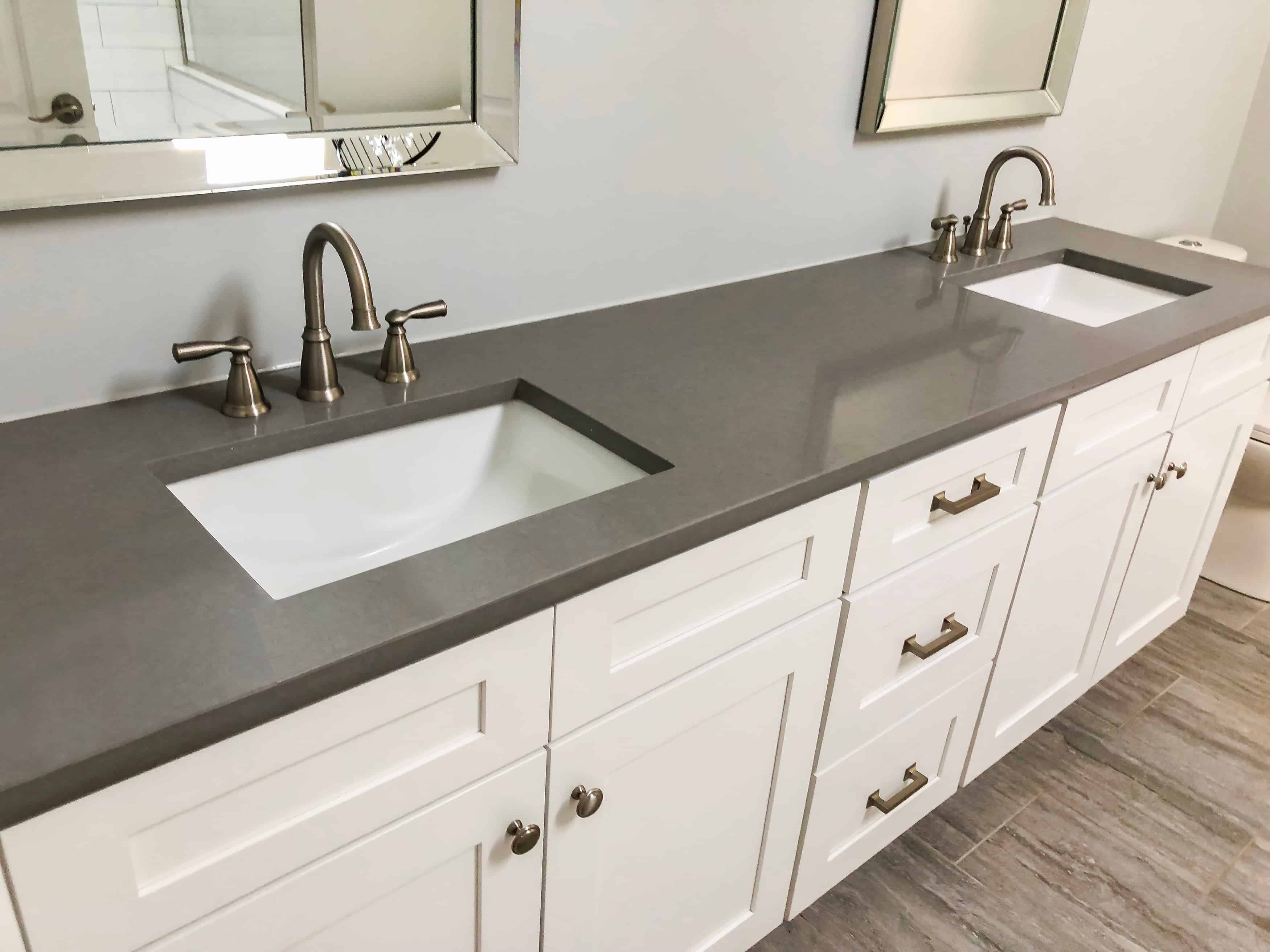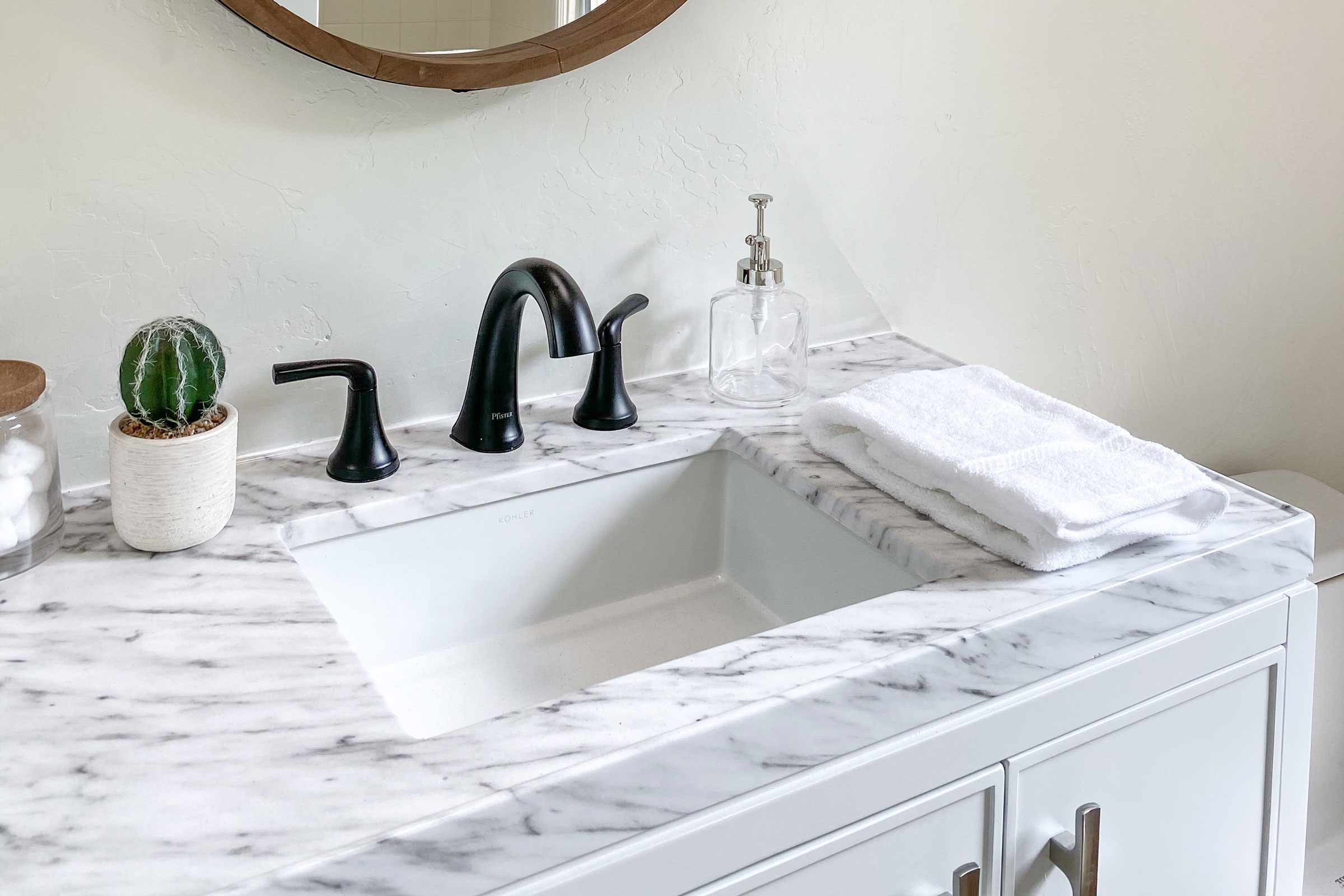Popular Countertop Materials for Bathrooms

Choosing the right countertop material for your bathroom is a crucial decision that can significantly impact the overall look, feel, and functionality of the space. The countertop serves as a focal point, adding style and practicality to your bathroom.
Types of Countertop Materials
The choice of countertop material depends on your preferences, budget, and the overall design aesthetic of your bathroom. Here are some of the most popular countertop materials used in bathrooms:
- Natural Stone: Natural stone, such as granite, marble, and quartz, is a popular choice for bathroom countertops. It offers a unique and elegant look, with a wide range of colors and patterns.
- Engineered Stone: Engineered stone, like quartz, is a man-made material that combines crushed natural stone with resin. It offers a similar look to natural stone, but it is more durable and less porous.
- Laminate: Laminate is a budget-friendly option that offers a variety of colors and patterns. It is also easy to clean and maintain.
- Solid Surface: Solid surface is a non-porous material that is seamless and easy to clean. It is available in a variety of colors and patterns.
- Tile: Tile is a versatile option that can be used to create a variety of looks. It is also relatively inexpensive and easy to maintain.
- Wood: Wood countertops can add warmth and natural beauty to a bathroom. However, they require more maintenance than other materials.
Advantages and Disadvantages of Countertop Materials
Each countertop material has its own set of advantages and disadvantages. Here is a detailed comparison of the most popular countertop materials:
- Natural Stone:
- Advantages: Unique and elegant look, wide range of colors and patterns, durable and scratch-resistant.
- Disadvantages: Expensive, porous and susceptible to stains, requires regular sealing.
- Price Range: $50 to $200 per square foot.
- Durability and Maintenance: Natural stone is durable and scratch-resistant, but it is porous and susceptible to stains. Regular sealing is required to protect the stone from stains and damage.
- Engineered Stone:
- Advantages: Durable and scratch-resistant, non-porous and stain-resistant, easy to clean and maintain.
- Disadvantages: Can be expensive, limited color and pattern options compared to natural stone.
- Price Range: $60 to $150 per square foot.
- Durability and Maintenance: Engineered stone is very durable and scratch-resistant. It is also non-porous and stain-resistant, making it easy to clean and maintain.
- Laminate:
- Advantages: Budget-friendly, wide range of colors and patterns, easy to clean and maintain.
- Disadvantages: Not as durable as natural stone or engineered stone, can be easily damaged by heat and scratches.
- Price Range: $10 to $50 per square foot.
- Durability and Maintenance: Laminate is a relatively durable material, but it can be easily damaged by heat and scratches. It is also susceptible to moisture damage.
- Solid Surface:
- Advantages: Non-porous and stain-resistant, seamless and easy to clean, available in a variety of colors and patterns.
- Disadvantages: Can be scratched, susceptible to heat damage, can be expensive.
- Price Range: $40 to $100 per square foot.
- Durability and Maintenance: Solid surface is a durable material that is resistant to stains and scratches. It is also easy to clean and maintain.
- Tile:
- Advantages: Versatile and customizable, relatively inexpensive, easy to clean and maintain.
- Disadvantages: Grout lines can be difficult to keep clean, can be easily damaged by heavy objects.
- Price Range: $5 to $30 per square foot.
- Durability and Maintenance: Tile is a durable material that is easy to clean and maintain. However, grout lines can be difficult to keep clean and can be susceptible to staining.
- Wood:
- Advantages: Warm and natural look, can be customized with different finishes.
- Disadvantages: Requires regular maintenance, susceptible to water damage, can be expensive.
- Price Range: $50 to $150 per square foot.
- Durability and Maintenance: Wood countertops require regular maintenance, including sealing and cleaning. They are also susceptible to water damage and can be expensive to replace.
Factors to Consider When Choosing Countertop Material: What Is The Best Countertop Material For Bathrooms

Choosing the right countertop material for your bathroom is a crucial decision that can significantly impact the overall look, functionality, and longevity of your space. It’s not just about aesthetics; it’s about finding a material that aligns with your specific needs and preferences.
Bathroom Style and Design
The style and design of your bathroom play a vital role in determining the best countertop material. A modern bathroom, for instance, might benefit from sleek, minimalist surfaces like quartz or concrete, while a traditional bathroom might embrace the warmth and elegance of natural stone like granite or marble. Consider the overall color palette, the existing fixtures, and the desired ambiance to guide your selection.
Bathroom Size and Layout
The size and layout of your bathroom are also important considerations. Smaller bathrooms may benefit from lighter-colored countertops to create an illusion of more space, while larger bathrooms can accommodate darker or bolder materials. The shape of your countertops and the placement of sinks and other fixtures will also influence your material choices.
Homeowner Needs and Preferences
Understanding the specific needs and preferences of the homeowner is crucial. For example, families with young children may prefer a durable and stain-resistant material like laminate or engineered stone, while homeowners who prioritize a luxurious look might opt for natural stone. Consider factors such as daily usage, maintenance requirements, and personal taste to make an informed decision.
Budget and Lifestyle
Budget and lifestyle play a significant role in determining the best countertop material. Natural stone, while beautiful, can be expensive, while more affordable options like laminate or engineered stone offer a balance of style and affordability. Consider your budget constraints and your lifestyle habits, such as how often you entertain or how much time you’re willing to dedicate to maintenance.
Comparison of Popular Materials

Choosing the right countertop material for your bathroom can be overwhelming, with so many options available. This section compares and contrasts four popular countertop materials: granite, marble, quartz, and laminate, to help you make an informed decision.
Comparison Table, What is the best countertop material for bathrooms
The table below summarizes the key characteristics of each material, allowing you to quickly compare them based on cost, durability, maintenance, and style.
| Material | Cost | Durability | Maintenance | Style |
|---|---|---|---|---|
| Granite | High | Very Durable | High | Natural, Unique Patterns |
| Marble | High | Durable | High | Elegant, Classic, Vein Patterns |
| Quartz | Medium to High | Very Durable | Low | Uniform, Modern, Variety of Colors |
| Laminate | Low | Less Durable | Low | Wide Range of Styles, Mimics Other Materials |
Visual Illustrations and Descriptions
Granite
Imagine a countertop with a rich, natural texture, showcasing a swirling mix of colors and patterns. That’s granite. This igneous rock is formed from cooled magma, resulting in unique, intricate patterns that are unlike any other. Its durability makes it a popular choice for high-traffic areas, and its resistance to heat and scratches ensures long-lasting beauty.
Marble
Marble, a metamorphic rock, exudes elegance and sophistication. Its characteristic veining, a result of mineral deposits, adds a touch of timeless beauty to any bathroom. While durable, marble is more porous than granite, making it susceptible to stains and etching.
Quartz
Quartz countertops offer a modern, sleek look. They are engineered from crushed quartz crystals and resin, resulting in a non-porous, stain-resistant surface. The uniformity of quartz provides a clean, contemporary aesthetic, with a wide range of colors and patterns available.
Laminate
Laminate countertops are the most affordable option, offering a wide range of styles to mimic other materials like granite or marble. It’s a good choice for budget-conscious homeowners, but it’s less durable than natural stone or engineered quartz.
What is the best countertop material for bathrooms – The choice of countertop material for bathrooms is often a matter of personal preference and budget, with factors like durability, stain resistance, and aesthetic appeal playing a role. However, while these practical considerations are crucial, it’s also important to consider the impact of a bathroom’s environment on its occupants.
A recent study on the best bathroom stall graffiti found that creative expression can play a role in reducing stress and fostering a sense of community. Ultimately, the best countertop material for your bathroom should be one that aligns with your personal style and contributes to a positive and inspiring atmosphere.
Choosing the right countertop material for your bathroom is a crucial decision, as it will impact both the aesthetics and functionality of the space. While natural stone like granite and marble offer elegance and durability, they can be porous and susceptible to staining.
To combat unpleasant odors that can arise in bathrooms, consider investing in a best bathroom odor neutralizer to keep the air fresh. Ultimately, the best countertop material for your bathroom depends on your individual needs and preferences, but ensuring proper ventilation and odor control is essential for a comfortable and inviting space.